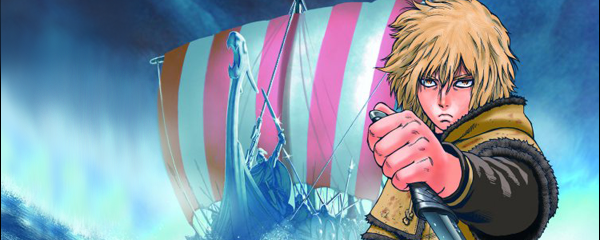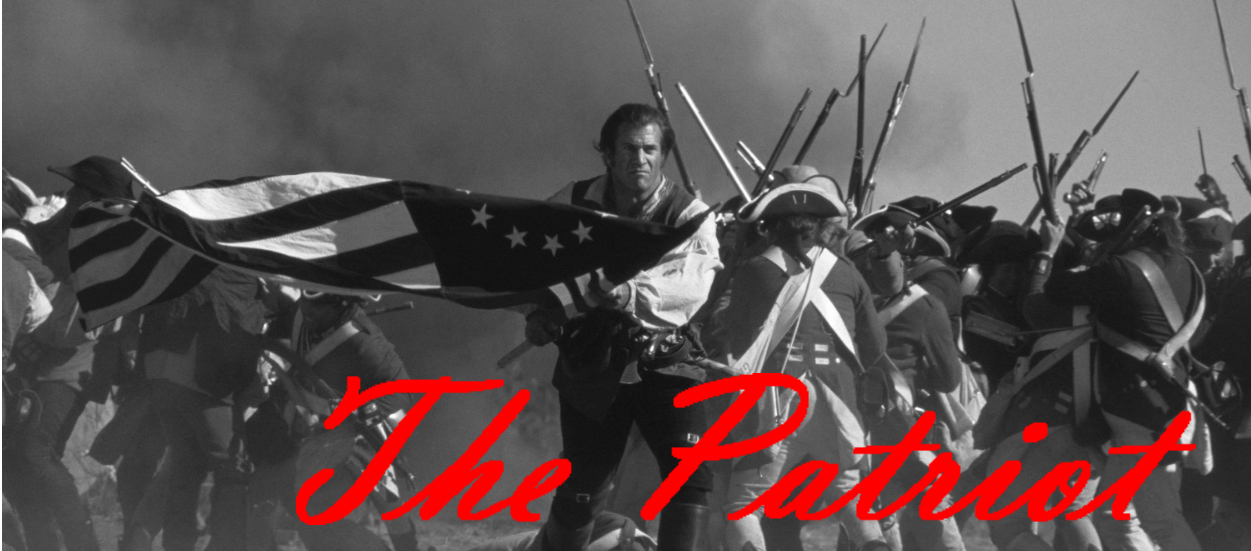There’s an old saying that “The winner of a conflict writes the history.” Now the issue with the quote is that to a certain extent, it’s not always true anymore. Wars that took place back in the bad old days tended to be the kind where the losers were forcibly moved, wiped out, or integrated into the group that won. Of course, it didn’t help that the only people that actually wrote things down for the historical record were priests who had a particular point of view on the subject. At the very least, you could call them biased.
Which gets us back to that saying. In the modern era, it turns out that Fallout was wrong – war does change. We live in an age where conflicts are fought over ideology. This means that the losers don’t get wiped out, and instead get to continue their lives after giving things back and promising not to start shit again. But unlike back in the old days, the people themselves continued to exist. They may have lost, but since literacy is a thing now, they wrote about losing. So no longer is history written by the victor, but instead is actually written by everybody involved. Since Memorial Day recently just passed, I thought it would be interesting to take a look at some of the the major wars of the 20th Century, and then consider the literature and films that told the history and the aftermath as they saw it. Turns out, the best art doesn’t always come out of winning.
The Great War
Who Won : Nobody really, but the US lost less than everybody else.
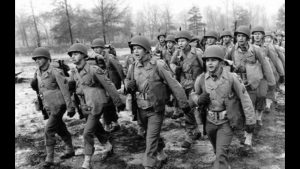
Before it was called World War 1, it was just called “The Great War,” because in terms of sheer scale it made the entire Napoleonic era look like a Halo skirmish. What’s really interesting about WW1 is that there really isn’t a villain. It’s easy to say that Germany started it, but really it was a whole series of alliances that automatically triggered declarations of war. The truth of the battlefield was that the full force of the Industrial Revolution turned towards the goal of blowing a bunch of people up. Guns became mechanized, the air became poisonous and the loss of human life could only be described using numbers with commas in them. Once that sort of war had begun nobody was going to back out. They’d already spent so much in terms of resources and, you know, people. All of this ended up creating a conflict that was less “heroic” than “tragic.”
In the end, basically everybody lost. Germany surrendered but it was a Pyrrhic victory for everybody involved. If you really want a good idea about how psychologically damaging The Great War was to people, just look at the art that came out in the 20s and 30s and the Lost Generation. It’s a group that makes Nihilists look like optimists. Although to be fair – some of the best stuff ever written came out of the experiences of people that survived. What they endured was so perspective altering that they never really recovered.
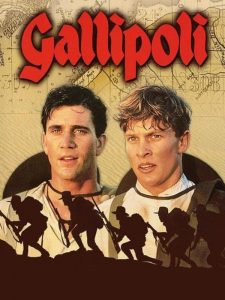 Whole countries never recovered, and I’m not just talking about how the Middle East continues to be a colossal clusterfuck because of how borders were redrawn. No I’m talking about countries like Australia, who as members of the British Empire, sent troops halfway around the world to fight in a war that really didn’t concern them. To this day the Battle of Gallipoli is remembered in Australia and New Zealand as Anzac Day. It’s like their Memorial Day or Armistice Day.
Whole countries never recovered, and I’m not just talking about how the Middle East continues to be a colossal clusterfuck because of how borders were redrawn. No I’m talking about countries like Australia, who as members of the British Empire, sent troops halfway around the world to fight in a war that really didn’t concern them. To this day the Battle of Gallipoli is remembered in Australia and New Zealand as Anzac Day. It’s like their Memorial Day or Armistice Day.
From a movie perspective, the film Gallipoli is about that sense of loss. It tells the story of 2 young Australians (one of which is played by a young, not yet crazy Mel Gibson) who enlist in the army and are eventually made to carry messages. Along the way they meet a bunch of other Australian soldiers and are saddened as they are all killed in battle. Eventually, due to a logistical screw up, one of them is sent over the top and the film ends with him being killed by gunfire.

Of course, I would be remiss if I didn’t mention All Quiet on the Western Front. It’s one of the classics of the Lost Generation written by Erich Maria Remarque. He was conscripted into WW1 and sent to fight for the Kaiser on the Western Front. Like most people that fought there, he was wounded. Unlike most people that fought there – he survived. The story that he tells in All Quiet is one where the young, patriotic new recruits of the German Army are slowly disillusioned when they discover that there is nothing really heroic about going to war.
The US didn’t enter the war until much later, and once they arrived, WW1 was in the final stages. WW1 didn’t have quite the devastating effect on the US as it had on the other countries involved, since the war came to an end almost as soon as they showed up. An example of this in film is Sergeant York. It tells the story of a religious man who is unsure if he should fight the Germans or if it is against his beliefs. It’s actually based on the life of a real person, but in the film York thematically represents the US, who was unsure about whether to enter the war or not. Once he’s signed up, the audience is treated to a film that in many ways reminds me of that propaganda film fromInglourious Basterds, which really sums up WW1. It was the worst thing ever for people that showed up on time, and the US got to come in at the last minute humming “Heroes.”
World War 2
Who won : The Allies, but mostly the US and the USSR.
 Here’s a true fact – WW2 was more destructive than WW1. Yet, for some reason WW2 didn’t trigger the same kind of existential fallout that WW1 did. Now it can be argued that trench warfare was exceptionally more damaging to the psyche than the battles of WW2, but that doesn’t take into account the numbers of casualties on every side. I have a theory though. WW1 had been seen as a sort of giant accident, and at the end of the day, the soldiers really had no solid idea of why they were fighting. In the Second World War, the why was obvious – there were Nazis in them thar hills. WW2 wasn’t as psychologically destructive to an entire generation because it had a villain. Speaking to people who fought in the war, they all have the same refrain of, “We did what we had to do to stop the Nazis.”
Here’s a true fact – WW2 was more destructive than WW1. Yet, for some reason WW2 didn’t trigger the same kind of existential fallout that WW1 did. Now it can be argued that trench warfare was exceptionally more damaging to the psyche than the battles of WW2, but that doesn’t take into account the numbers of casualties on every side. I have a theory though. WW1 had been seen as a sort of giant accident, and at the end of the day, the soldiers really had no solid idea of why they were fighting. In the Second World War, the why was obvious – there were Nazis in them thar hills. WW2 wasn’t as psychologically destructive to an entire generation because it had a villain. Speaking to people who fought in the war, they all have the same refrain of, “We did what we had to do to stop the Nazis.”
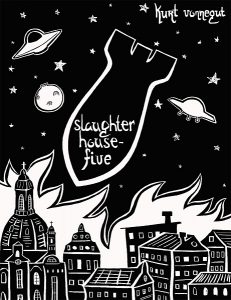
That’s not to say that it wasn’t bad. Many people came back from the War and were haunted by their experiences. War is, after all, just the worst. Yet others felt like they had gone on a life changing adventure and had helped to save the world. The fact remained that, even at the end of the day, a lot of people died. These were people that could have lived long lives if everybody had just gotten along. This is what we see in the art that came out of the post war period. There is a stunning satire that goes with a lot of WW2 fiction. Authors like Kurt Vonnegut and his seminal Slaughterhouse-Five looked at the pointlessness of war as a whole. Even in victory the toll could be great. Joseph Heller’s Catch-22 looked at how absurd the whole thing could be, and how war could be silly.
Other writers would write about how, upon returning, they didn’t feel like they belonged anymore. Seeing the world and fighting to save it meant that everything else had the volume turned down. Soldiers would talk about being displaced and how common things like living in a quiet town or going shopping, didn’t feel so common anymore. Out of this came a movement called the Beat Generation. They wrote literature that looked at the US itself as a strange and foreign place. They wrote about people who wander and are lost in themselves even as they try to find somewhere that made sense. On The Road by Jack Kerouac is an example of this post war literature (and like everything else mentioned so far – really great).
The films about WW2 are often something else entirely, because the Nazis are really great villains. If you are in need of an evil empire for your movie, the Nazis fit the bill. It’s so rare that the US gets to pretend to be the underdog. I mean, Indiana Jones shoots Nazis because they’re wonderful antagonists and 10 million Call of Duty fans can’t be wrong. For the Nazis there’s no nuance whatsoever. They’re a group you can point at and say, without a hint of irony, that those guys are super evil.
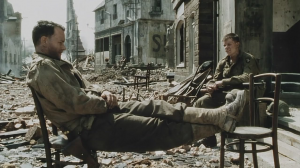
From a movie perspective, one of the better ones about WW2 is Saving Private Ryan. Now I have this on the list because it’s not just an adventure movie. There are dozens of those, including The Guns of Navarone, and The Bridge on River Kwai. But Saving Private Ryan is great because it shows both sides of the emotional spectrum of the war. On the one hand it tells the story about a group of men on an adventure against insane odds. At the same time it’s about the toll that actually being in combat and watching people you care about be killed can take on people. Saving Private Ryan asks the audience to recognize that even though the Nazis were stopped, there was a cost there. The film shows that the war was not all some adventure, and there’s a reason that many of those that came back didn’t feel like they belonged anymore.

Then again, not all “war” movies are about the war specifically. For example while Japan lost WW2, they made movies about it. One of the ones that doesn’t immediately spring to mind as a war movie is also probably the most famous Japanese movie of all time – Godzilla. Yeah, I know what you’re thinking, “Godzilla is a kaiju movie, not a war movie.” Well, you’re half right, but consider when this movie was made to put it in the correct context. Godzilla is a massive creature born of nuclear power and radioactivity that comes from the Pacific Ocean to lay waste to Japanese cities. The only way that Godzilla could be more on the nose with the metaphor would be if the kaiju was dressed like Captain America. In Godzilla, the Japanese are able to defeat it – but not with their military. Instead the film is a cautionary tale about the dangers of nuclear weapons and the perseverance of the Japanese spirit.
Vietnam
Who won : Not the US – Helicopter evacuation of their Embassy isn’t something that winners do.

Oh Vietnam. In the long term I’m not sure there has ever been a conflict that has been as damaging to the United State’s sense of self than this war. Basically, we were fighting in Vietnam as a proxy for the Soviet Union. During the Cold War, since we couldn’t fight communists directly because they were packing heat so instead we engaged in smaller conflicts that were less likely to end in nuclear destruction. Basically, the thinking was that if communism spread, the whole world would fall to it like dominoes.
What’s interesting is that unlike WW2, there wasn’t really a villain. If anything, the US was the bad guy. We were fighting in another country, against the native population, in an effort to control their economic policies. All of it on the basis of Domino Theory, something that was eventually shown to be nonsense. We weren’t saving the world or anything so noble. When it came to Vietnam, we lost a war that we shouldn’t have fought in the first place.
What emerged from the fallout of Vietnam was a sense in America that we had lost, and had been lied to. The loss and the Watergate Scandal (look it up kids!) made people reconsider their faith in the institutions that surrounded them. It made them wary of their government and gave them a feeling that maybe the United States wasn’t invincible. What’s weird about Vietnam is that it didn’t seem to have the same immediate effect on literature that previous conflicts did. There was no Lost Generation or Beats that came out of it. It was almost as if everybody wanted to forget that it ever happened.
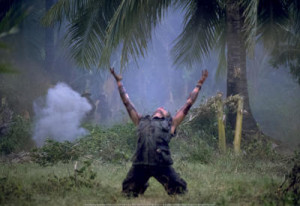
At least that was true until the 1980s. Vietnam was the first conflict where a lot of the “literature” that came out of it was cinema and it’s almost all critical. One of the best is Platoon. It tells the story of a soldier named Chris Taylor, who discovers that combat in Vietnam is brutal, the people he’s fighting with have lost their sense of humanity, and how eventually, it all ends with the pointless deaths of friends and foes. Platoon was written by Oliver Stone, who actually fought in Vietnam, and used his experiences as a basis for the film.
Full Metal Jacket is another great film that looks into the experience of Vietnam. In that movie, Stanley Kubrick explores the violence and horror of the war. But at the same time revels in the absurdity and dark humor. It shows the war as pointless, and argues that bunch of people were killed for nothing. There’s a deep seated feeling there people were made to kill and firebomb and die because of an abstract political concept. It’s not so much that they didn’t understand their enemy, it’s that the people they were fighting weren’t really their enemy in the first place. Eventually nothing makes sense to them at all. In the end, that’s what happens one by one to the characters of Full Metal Jacket, as they slowly lose all sense of perspective and morality before succumbing to a war they don’t really believe in.
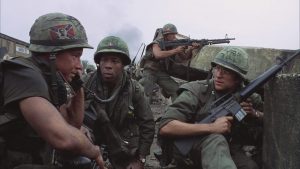
But film in the 1980s also explored the ramifications of even being present in Vietnam. The Deer Hunter is a deep exploration of PTSD and the feeling that life has no value. Hell, even First Blood tells the story of a John Rambo, who went to Vietnam and came back so deeply traumatized that he still thinks that he’s in combat. In all, the stories that came out of Vietnam for the US mirrored many of the themes from WW1 for the rest of Europe, namely that a lot of people died and there was no reason. So when the soldiers returned, the lives they led were gone because the people that they were had changed so irrevocably.
In the end, in the 20th Century history wasn’t always written by the winners. Even when they won the effects of the conflict could be seen for a generation afterwards. But at some point, what was written down wasn’t just the history – but the stories. And that’s a sign of what good art is, whether it’s film or literature, it tells a story and makes you feel something. Sometimes it makes the world a scary place, and sometimes it makes you feel like good is possible if only people are willing to fight for it.






